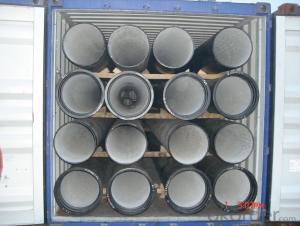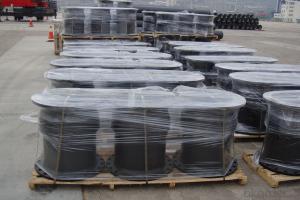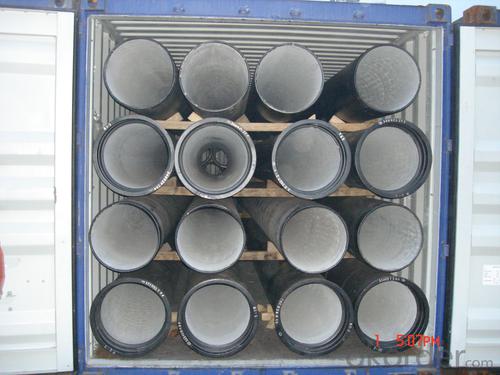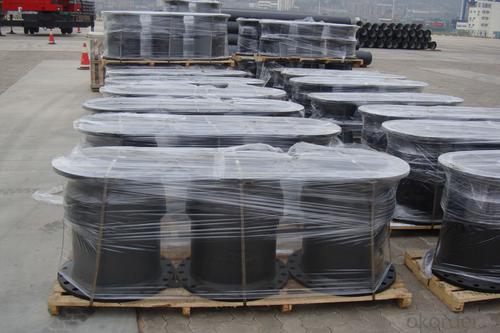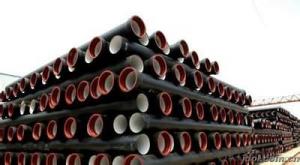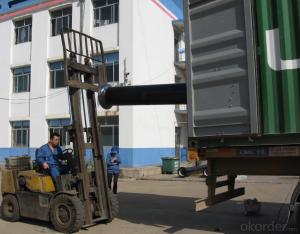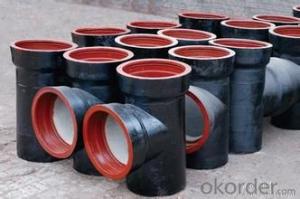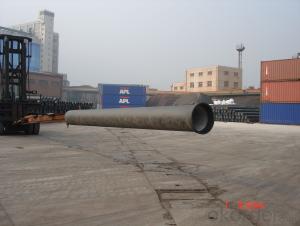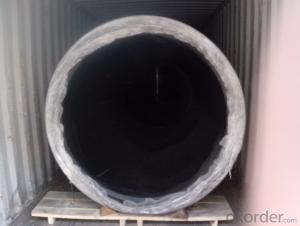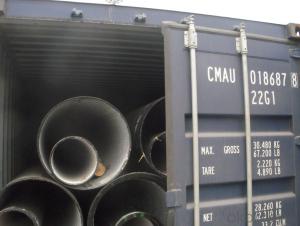DUCTILE IRON PIPES C Class DN1200
- Loading Port:
- China Main Port
- Payment Terms:
- TT OR LC
- Min Order Qty:
- -
- Supply Capability:
- -
OKorder Service Pledge
OKorder Financial Service
You Might Also Like
Ductile Iron Cast Pipe is without any defects compare with tradition casting tech, which has many advantages particularly as follow:
(1) High density. In the "vertical upward casting" process, the melt iron of centre liquid column in center crystallizer is continuously feeding for volume shrinkage caused by condensation tube at outer circumference , which lead to be free of shrinkage porosity.
(2) High purity. When melt iron pouring, the mixed impurities such as gas, dross, sand grain which are lighter than melt iron could be eliminated at furnace mouth, its impossible to enter into the crystallizer through the channel, so the melt iron into the crystallizer is very pure.
(3) Strength with toughness. The cooling speed provided by continuous crystallizer is 30 times than sand casting and 5 times than centrifugal casting, and doesn't produce white iron, the eutectic cell volume of continuous cast iron is one eighth to one tenth compare with traditional cast iron. The density of graphite nodule in ductile iron can reach 300-700 pcs/mm2. Therefore, all reason above improve the strength and toughness of continuous cast iron.
(4) Free machining. The high speed cooling make the hardening phase (such as boride, steadite) not appear like reticular, massive or thick, but diffuse like fish bone and pane in shape, moreover, there are tiny graphite flakes inlaid hardening phase. It's free machining in BrinellHardness the range of 250-300HB. However, the Brinell Hardness of 250 is top limit to common metal materials.
(5) Uniform composition of tube wall. The convection mixing of liquid column caused by marching type drawing in crystallizer make the composition of tube wall well-distributed, and concentration gradient very little.
(6) High productivity. To the wall thickness of tube under 10mm, the speed of continuous casting is 1 meter/min, to the wall thickness of tube under 20mm, the speed of continuous casting is 0.5 meter/min, which is high efficiency that centrifugal or other casting tech couldn't reach.
- Q: Can ductile iron pipes be used in high-pressure applications?
- Yes, ductile iron pipes can be used in high-pressure applications. Ductile iron has excellent mechanical properties and high tensile strength, making it suitable for withstanding high-pressure conditions. Its inherent toughness and durability allow it to handle the stress and pressure exerted on the pipes, making it a reliable choice for various high-pressure applications.
- Q: What is the expected noise reduction of ductile iron pipes?
- Several factors can influence the expected noise reduction of ductile iron pipes. These factors include the characteristics of the pipe material and design, the installation method, and the surrounding environment. Generally, ductile iron pipes have been found to offer significant noise reduction compared to other pipe materials. Ductile iron pipes are renowned for their superior acoustic performance, thanks to their dense and robust construction. The material's high density helps absorb and dampen noise vibrations, thus reducing the transmission of sound waves through the pipe. Furthermore, the smooth internal surface of ductile iron pipes minimizes turbulence and friction, contributing further to noise reduction. Numerous studies and field tests have demonstrated that ductile iron pipes can achieve noise reductions ranging from 10 to 20 decibels (dB) or even higher, depending on specific conditions. These noise reductions can greatly enhance the acoustic environment in areas where the pipes are used, such as residential areas, hospitals, or schools. It is important to acknowledge that while ductile iron pipes can provide substantial noise reduction, other factors like pipe connections, fittings, and valves can impact the overall acoustic performance. Proper installation techniques, including the utilization of effective seals and dampers, can further enhance noise reduction. In conclusion, ductile iron pipes are expected to offer significant noise reduction benefits due to their dense construction, smooth internal surface, and efficient installation methods. However, it is crucial to consider the specific requirements of each project and consult professionals to determine the anticipated noise reduction levels based on the particular circumstances.
- Q: How can the ductile iron pipe elbow be fixed?
- The utility model relates to a groove connecting pipe which has the function of sealing and sealing, and mainly comprises three parts: a sealing rubber ring, a clamping band and a locking bolt. The inner rubber sealing ring is arranged on the outer side of the connecting pipe and is matched with the pre rolling groove, and then the outer ring is buckled on the rubber ring, and then can be fastened with two bolts. Because of the special sealing structure design of the rubber sealing ring and the clamp hoop, the groove connecting piece has good sealing property, and the sealing property is enhanced correspondingly with the increase of the fluid pressure in the pipe.
- Q: What is the maximum allowable joint deflection for ductile iron pipes?
- The maximum allowable joint deflection for ductile iron pipes is typically specified by industry standards and guidelines. These standards may vary depending on the specific application and local regulations. In general, the maximum allowable joint deflection for ductile iron pipes is usually limited to a range between 1% to 5% of the pipe diameter. This means that the pipe can typically tolerate a deflection of up to 1% to 5% of its diameter without causing any significant damage or compromising its structural integrity. However, it is important to note that the exact maximum allowable joint deflection may vary depending on factors such as pipe size, wall thickness, and operating conditions. It is recommended to consult the relevant industry standards, such as those published by the American Water Works Association (AWWA) or the International Organization for Standardization (ISO), for specific guidelines on maximum allowable joint deflection for ductile iron pipes in a given application.
- Q: The role of chromium in nodular cast iron
- In the bending fatigue test of crankshaft, it is also found that the chromium containing cast nodular iron crankshaft has the characteristics of large ultimate bending moment, high safety factor, overload duration, high strength and small deformation.
- Q: Is it better to use steel tubes or ductile iron pipes for water supply?
- In summary, if the demand is not high, the use of stable environment, pressure and vibration is not a place recommend the use of ductile iron pipe; if is an important facility for high requirements or site conditions, abnormal conditions, vibration and impact may be relatively large, with ordinary seamless steel tube.
- Q: Are ductile iron pipes suitable for trenchless pipe ramming installations?
- Ductile iron pipes are indeed appropriate for trenchless pipe ramming installations. This material possesses remarkable strength and durability, enabling it to withstand the impact and stress encountered during the ramming process. Its exceptional tensile strength allows it to resist cracking or breaking when subjected to pressure. Moreover, ductile iron pipes are highly resistant to corrosion, rendering them ideal for underground installations. Furthermore, their smooth interior surface promotes fluid or gas flow. All in all, ductile iron pipes present a dependable and economical choice for trenchless pipe ramming installations.
- Q: How do ductile iron pipes handle ground settlement near construction sites?
- Ductile iron pipes are highly resilient and can withstand ground settlement near construction sites. Due to their flexible nature, these pipes can accommodate small movements and settlement without incurring significant damage or failure. The ductility of the material allows the pipes to bend and adjust to the changing ground conditions, ensuring their integrity and minimizing the risk of leaks or breakage. Additionally, the strong and durable properties of ductile iron make it a reliable choice for underground infrastructure, providing long-term stability even in challenging environments.
- Q: What is the expected hoop stress capacity of ductile iron pipes?
- The capacity for hoop stress expected in ductile iron pipes can vary depending on various factors, including the diameter, wall thickness, and material grade of the pipes. However, as a general rule, ductile iron pipes possess a high level of strength and durability, enabling them to withstand significant levels of hoop stress. Ductile iron pipes are specifically designed and manufactured to meet certain standards and requirements, such as those put forth by the American Water Works Association (AWWA) C151 and C115 standards. These standards ensure that the pipes possess the necessary strength to handle the expected loads and pressures that they will encounter throughout their lifespan. The capacity for hoop stress in ductile iron pipes primarily relies on their tensile strength. Ductile iron is a form of cast iron that has been treated to exhibit ductility, meaning it can withstand tensile stress without fracturing. This characteristic makes it suitable for applications where the pipes may encounter internal or external pressure, such as water distribution systems or sewer lines. Engineers typically perform calculations to determine the anticipated hoop stress capacity of ductile iron pipes. These calculations take into account specific pipe dimensions, material properties, and expected operating conditions. Factors such as internal pressure, external loads, and safety factors required by design standards are considered in these calculations. It is important to verify the expected hoop stress capacity of ductile iron pipes using the manufacturer's specifications and engineering calculations. Furthermore, any modifications or repairs to the pipes should be carried out by qualified professionals following industry guidelines to ensure their ongoing strength and performance.
- Q: Are ductile iron pipes resistant to frost heave?
- Yes, ductile iron pipes are generally resistant to frost heave due to their strong and flexible nature.
Send your message to us
DUCTILE IRON PIPES C Class DN1200
- Loading Port:
- China Main Port
- Payment Terms:
- TT OR LC
- Min Order Qty:
- -
- Supply Capability:
- -
OKorder Service Pledge
OKorder Financial Service
Similar products
Hot products
Hot Searches
Related keywords
